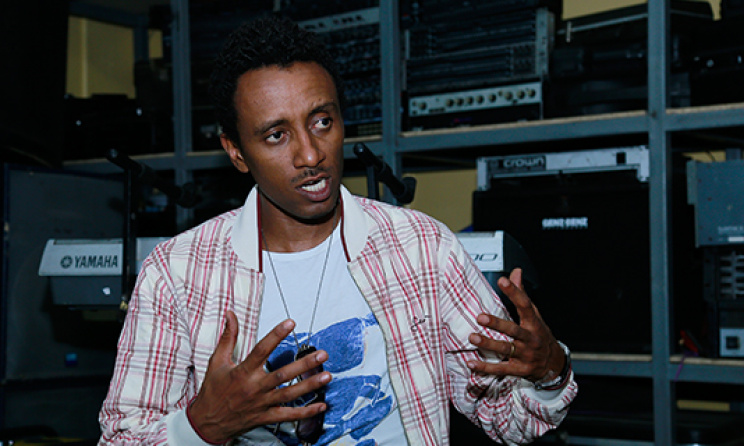Ethiopia’s Henok Mehari working with Cynthia Morgan at Coke Studio
Nine years after he last toured Kenya, Ethiopian singer and producer Henok Mehari is back in Nairobi to take part in the continental TV show Coke Studio Africa, where he will collaborate with Nigeria’s Cynthia Morgan on a unique fusion of Ethiopian and Nigerian music.
 Ethiopian artist Henok Mehari. Photo: www.addisfortune.net
Ethiopian artist Henok Mehari. Photo: www.addisfortune.net The Mehari Brothers Band. Photo Mehari Brothers band Facebook page
The Mehari Brothers Band. Photo Mehari Brothers band Facebook page
Music In Africa spoke to Henok recently to find out more about his work.
“It feels great to be back in Nairobi!" he said. "My participation at Coke Studio Africa is really timely. After the release of my album 790, I have been encouraging my band the Mehari Brothers that we need to forge newer working relations with other artists outside Ethiopia. Coke Studio Africa is thus a timely opportunity to explore and find out what other artists are doing and how we can work together.”
While in Kenya, Henok will collaborate with Nigerian singer Cynthia Morgan, whose music is a fusion of pop, hip-hop and dancehall. She shot into limelight following the release of two hit singles, ‘Don't Break My Heart’ and ‘Lead Me On’, which received massive airplay and positive reviews.
“I am happy to be part of the Coke Studio Africa platform. I am excited to be among Ethiopia's pioneer participant at Coke Studio Africa, " says Henok.
"I hope this will be a way for me to start communicating with other artists from other African countries, as well as connect with other producers. I hope this will lead to more opportunities and that in future we can come back as a band to participate at Coke Studio Africa."
New album
A talented musician, songwriter and producer who has also worked on various film soundtracks, Henok is best known for his role in the Mehari Brothers Band, along with his of brothers Robel, Lwam and Halal, who follow in the footsteps of their late father Mehari Abraha, who was also a musician. Henok and Robel are both graduates of Yared School of Music, the leading institution of higher learning for music in Ethiopia. Henok graduated with a major in piano, while Robel was a clarinetist but later took up guitar to become of the best guitarists in the country. Having a background in gospel music, Henok made his professional debut at the age of 24 with the Express Band.
This year has already been an eventful one for the Ethiopian artist, who released his second album, 790, in April. It comes 12 years after his debut album, Éwnetegna Fiqir, was released in 2004. Henok says the title of the new album was inspired by his childhood house where he grew up. “I was picking names for the album but I wasn't happy with any of the song titles. I then asked myself when the musical journey began for my brothers and me. We come from a very musical family: our father was a singer-songwriter while our mother was a dancer-choreographer. As children we grew up in a neighbourhood where the houses were numbered and ours was 790. I realized this is where it all began, hence the album title,” explains Henok.
With the new album already on the market for a few months, Henok says that audiences is finally starting to warm up to the music. “The music my brothers and I do is a bit modern, it is both Afro-fusion with elements of European music. It thus means the audience takes time before they can fully embrace it."
Two singles from the new 15-track album, 'Ewèdishalèhu’ and ‘Yenenesh’, are getting onto local radio charts and have attracted plenty of positive comments online, with fans hailing the album's "very new and fresh sound".
Looking beyond Coke Studio Africa, Henok is excited to get back to Ethiopia, where he will start working on a nationwide tour to promote the new album. He hopes to then take their music to the rest of the world. “We hope that the tour of the nine cities will begin in October,” notes Henok. "Immediately after this tour we look forward to touring the US and Europe."
New hope for Ethiopian pop bands
The Mehari Brothers started off backing artists like Zeritu Kebede and have also worked with other leading Ethiopian acts, including Teddy Afro, Johnny Ragga and Eyob Mekonnen. Before the Mehari Brothers emerged on the Ethiopian scene, singers usually received the most attention at live shows, with bands relegated to a back-up role.
“In 2006 when we started out we were seven," explains Henok. "The seven of us were always performing on the stage, and people in Ethiopia had not witnessed this kind of energy on stage. We therefore started the 'band culture', where bands are no longer subjected to the background but are the centre of action and attention. After that we saw many bands emerge. I believe we brought about this kind of change.”
Indeed more pop bands are emerging out of Ethiopia and are attracting global attention for their music - for example, Jano Band and Fendika.
Henok adds that while Ethiopia is better known for its Ethio-Jazz and traditional genres, modern popular music is still not given much attention. "As Ethiopian artists we don't lack the talent but we have been isolated when it comes to popular modern music,” he observes.
Henok & Mehari Brothers’ album 790 is available on CD and online via websites such as iTunes, Amazon.com, Google Play and Spotify.


































Comments
Log in or register to post comments